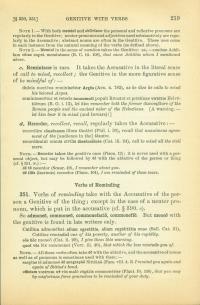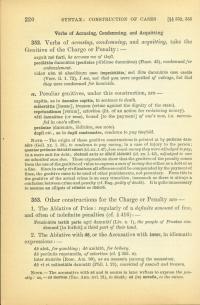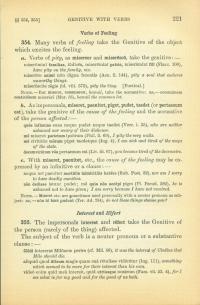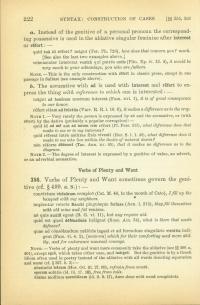350. Verbs of remembering and forgetting take either the accusative or the genitive of the object.
a. Meminī takes the accusative when it has the literal sense of retaining in the mind what one has seen, heard, or learned. Hence the accusative is used of persons whom one remembers as acquaintances, or of things which one has experienced. So oblīvīscor in the opposite sense—to forget literally, to lose all memory of a thing (very rarely, of a person).
Cinnam meminī. (Phil. 5.17)
I remember Cinna.
Utinam avum tuum meminissēs! (id. 1.34)
Oh! that you could remember your grandfather! (but he died before you were born)
Postumium, cûius statuam in Isthmō meminisse tē dīcis (Att. 13.32)
Postumius, whose statue you say you remember (to have seen) on the Isthmus
omnia meminit Sīron Epicūrī dogmata. (Acad. 2.106)
Siron remembers all the doctrines of Epicurus.
Multa ab aliīs audīta meminērunt. (De Or. 2.355)
They remember many things that they have heard from others.
Tōtam causam oblītus est. (Brut. 217)
He forgot the whole case.
Hinc iam oblīvīscere Grâiōs. (Aen. 2.148)
From henceforth forget the Greeks.
(i.e. not merely disregard them, but banish them from your mind, as if you had never known them).
b. Meminī takes the genitive when it means to be mindful or regardful of a person or thing, to think of somebody or something (often with special interest or warmth of feeling). So oblīvīscor in the opposite sense—to disregard, or dismiss from the mind—and the adjective oblītus (careless or regardless).
Ipse suī meminerat. (Verr. 2.2.136)
He was mindful of himself. (of his own interests)
Faciam ut hûius locī dieique meique semper memineris. (Ter. Eun. 801)
I will make you remember this place and this day and me as long as you live.
Nec mē meminisse pigēbit Elissae, dum memor ipse meī. (Aen. 4.335)
Nor shall I feel regret at the thought of Elissa, so long as I remember myself.
Meminerint verēcundiae. (Off. 1.122)
Let them cherish modesty.
Hūmānae īnfīrmitātis meminī. (Liv. 30.31.6)
I remember human weakness.
oblīvīscī temporum meōrum, meminisse āctiōnum (Fam. 1.9.8)
to disregard my own interests, to be mindful of the matters at issue
Nec tamen Epicūrī licet oblīvīscī. (Fin. 5.3)
And yet I must not forget Epicurus.
Oblīvīscere caedis atque incendiōrum. (Cat. 1.6
Turn your mind from slaughter and conflagrations. (dismiss them from your thoughts).
Note 1— With both meminī and oblīvīscor the personal and reflexive pronouns are regularly in the genitive; neuter pronouns and adjectives used substantively are regularly in the accusative; abstract nouns are often in the genitive. These uses come in each instance from the natural meaning of the verbs (as defined above).
Note 2— Meminī in the sense of mention takes the genitive.
eundem Achillam cûius suprā meminimus (B. C. 3.108)
that same Achillas whom I mentioned above
c. Reminīscor is rare. It takes the accusative in the literal sense of call to mind, recollect the genitive in the more figurative sense of be mindful of.
Dulcīs moriēns reminīscitur Argōs. (Aen. 10.782)
As he dies he calls to mind his beloved Argos.
Reminīscerētur et veteris incommodī populī Rōmānī et prīstinae virtūtis Helvētiōrum. (B. G. 1.13)
Let him remember both the former discomfiture of the Roman people and the ancient valor of the Helvetians.
[A warning— let him bear it in mind (and beware)!]
d. Recordor (recollect, recall) regularly takes the accusative.
Recordāre cōnsēnsum illum theātrī. (Phil. 1.30)
Recall that unanimous agreement of the [audience in the] theatre.
Recordāminī omnīs cīvīlīs dissēnsiōnēs. (Cat. 3.24)
Call to mind all the civil wars.
Note— Recordor takes the genitive once (Pison. 12); it is never used with a personal object, but may be followed by dē with the ablative of the person or thing (cf. § 351, Note, below).
Dē tē recordor. (Scaur. 49)
I remember about you.
Dē illīs (lacrimīs) recordor. (Planc. 104)
I am reminded of those tears.
Verbs of Reminding
351. Verbs of reminding take with the Accusative of the person a genitive of the thing; except in the case of a neuter pronoun, which is put in the accusative (cf. § 390.c). So admoneō, commoneō, commonefaciō, commonefīō. But moneō with the genitive is found in late writers only.
Catilīna admonēbat alium egestātis, alium cupiditātis suae. (Sall. Cat. 21)
Catiline reminded one of his poverty, another of his cupidity.
Eōs hōc moneō. (Cat. 2.20)
I give them this warning.
quod vōs lēx commonet (Verr. 3.40)
that which the law reminds you of
Note— All these verbs often take dē with the ablative, and the accusative of nouns as well as of pronouns is sometimes used with them.
Saepius tē admoneō dē syngraphā Sittiānā. (Fam. 8.4.5)
I remind you again and again of Sittius's bond.
officium vostrum ut vōs malō cōgātis commonērier (Plaut. Ps. 150)
that you may by misfortune force yourselves to be reminded of your duty
Verbs of Accusing, Condemning and Acquitting
352. Verbs of accusing, condemning, and acquitting, take the Genitive of the Charge or Penalty.
Arguit mē furtī.
He accuses me of theft.
pecūlātūs damnātus (pecūniae pūblicae damnātus) (Flacc. 43)
condemned for embezzlement
Videō nōn tē absolūtum esse improbitātis, sed illōs damnātōs esse caedis. (Verr. 2.1.72)
I see, not that you were acquitted of outrage, but that they were condemned for homicide.
a. Peculiar genitives, under this construction.
capitis, as in damnāre capitis to sentence to death
mâiestātis [laesae] treason
(crime against the dignity of the state)
repetundārum [rērum] extortion
(lit. of an action for reclaiming money)
vōtī damnātus (or reus bound [to the payment] of one's vow
(i.e. successful in one's effort)
pecūniae (damnāre, iūdicāre, see note)
duplī etc., as in duplī condemnāre condemn to pay twofold
Note— The origin of these genitive constructions is pointed at by the following.
pecūniae damnāre (Gel. 20.1.38)
to condemn to pay money (in a case of injury to the person)
quantae pecūniae iūdicātī essent (id. xx.1.47)
how much money they were adjudged to pay (in a mere suit for debt)
cōnfessī aeris ac dēbitī iūdicātī (id. xx.1. 42)
adjudged to owe an admitted sum due
These expressions show that the Genitive of the penalty comes from the use of the genitive of value to express a sum of money due either as a debt or as a fine. Since in early civilizations all offences could be compounded by the payment of fines, the genitive came to be used of other punishments, not pecuniary. From this to the genitive of the actual crime is an easy transition, inasmuch as there is always a confusion between crime and penalty (cf. Eng. guilty of death). It is quite unnecessary to assume an ellipsis of crīmine or iūdiciō.
353. Other constructions for the Charge or Penalty are--
- The Ablative of Price: regularly of a definite amount of fine, and often of indefinite penalties (cf. § 416).
Frusinātēs tertiā parte agrī damnātī (Liv. 10.1)
the people of Frusino condemned [to forfeit] a third part of their land - The ablative with dē, or the accusative with inter, in idiomatie expressions.
dē aleā
for gamblingdē ambitū for bribery
dē pecūniīs repetundīs
of extortion (cf. § 352.a, above).inter sīcāriōs (Rosc. Am. 90)
as an assassin (among the assassins)dē vī et mâiestātis damnātī (Phil. 1.21)
convicted of assault and treasonNote— The accusative with ad and in occurs in later writers to express the penalty.
ad mortem (Tac. Ann. 16.21)
to deathad (in) metalla
to the mines
Verbs of Feeling
354. Many verbs of feeling take the genitive of the object which excites the feeling.
a. Verbs of pity, as misereor and miserēscō, take the Genitive.
Miserēminī familiae, iūdicēs, miserēminī patris, miserēminī fīlī. (Flacc. 106)
Have pity on the family, etc.
Miserēre animī nōn dīgna ferentis. (Aen. 2.144)
Pity a soul that endures unworthy things.
Miserēscite rēgis. (id. 8.573)
Pity the king. [poetical]
Note— But miseror, commiseror (bewail) take the accusative
commūnem condiciōnem miserārī (Mur. 55)
bewail the common lot
b. As impersonals, miseret, paenitet, piget, pudet, taedet (or pertaesum est), take the genitive of the cause of the feeling and the Accusative of the person affected.
quōs īnfāmiae suae neque pudet neque taedet (Verr. 1.35)
who are neither ashamed nor weary of their dishonor
Mē miseret parietum ipsōrum. (Phil. 2.69)
I pity the very walls.
Mē cīvitātis mōrum piget taedetque. (Iug. 4)
I am sick and tired of the ways of the state.
Decemvirōrum vōs pertaesum est. (Liv. 3.67)
You became tired of the decemvirs.
c. With miseret, paenitet, etc., the cause of the feeling may be expressed by an infinitive or a clause.
Neque mē paenitet mortālīs inimīcitiās habēre. (Rab. Post. 32)
Nor am I sorry to have deadly enmities.
Nōn dedisse istunc pudet; mē quia nōn accēpī piget. (Pl. Pseud. 282)
He is ashamed not to have given; I am sorry because I have not received.
Note— Miseret etc. are sometimes used personally with a neuter pronoun as subject.
Nōn tē haec pudent? (Ter. Ad. 754)
Do not these things shame you?
355. The impersonals interest and rēfert take the genitive of the person (rarely of the thing) affected. The subject of the verb is a neuter pronoun or a substantive clause.
Clōdī intererat Milōnem perīre. (cf. Mil. 56)
It was the interest of Clodius that Milo should die.
aliquid quod illōrum magis quam suā rētulisse vidērētur (Iug. 111)
something which seemed to be more for their interest than his own
Videō enim quid meā intersit, quid utrīusque nostrum. (Fam. 7.23.4)
For I see what is for my good and for the good of us both.
a. Instead of the genitive of a personal pronoun the corresponding possessive is used in the ablative singular feminine after interest or rēfert.
Quid tuā id rēfert? Māgnī. (Ter. Ph. 723)
How does that concern you? Much.
[See also the last two examples above.]
Vehementer intererat vestrā quī patrēs estis. (Plin. Ep. 4.13.4)
It would be very much to your advantage, you who are fathers.
Note— This is the only construction with rēfert in classic prose, except in one passage in Sallust (see example above).
b. The accusative with ad is used with interest and rēfert to express the thing with reference to which one is interested.
Māgnī ad honōrem nostrum interest. (Fam. 16.1)
It is of great consequence to our honor.
Rēfert etiam ad frūctūs. (Varr. R. R. 1.16.6)
It makes a difference as to the crop.
Note 1— Very rarely the person is expressed by ad and the accusative, or (with rēfert) by the dative (probably a popular corruption).
Quid id ad mē aut ad meam rem rēfert? (Pl. Per. 513)
What difference does that make to me or to my interests?
Quid rēferat intrā nātūrae fīnīs vīventī? (Hor. S. 1.1.49)
What difference does it make to me who live within the limits of natural desire?
nōn rēferre dēdecorī (Tac. Ann. 15.65)
that it makes no difference as to the disgrace
Note 2— The degree of interest is expressed by a Genitive of Value, an adverb, or an adverbial accusative.
Verbs of Plenty and Want
356. Verbs of Plenty and Want sometimes govern the genitive (cf. § 409.a, Note).
Convīvium vīcīnōrum compleō. (Cat. M. 46; in the mouth of Cato)
I fill up the banquet with my neighbors.
Implentur veteris Bacchī pinguisque ferīnae. (Aen. 1.215)
They fill themselves with old wine and fat venison.
nē quis auxilī egeat (B. G. 6.11)
lest any require aid
Quid est quod dēfēnsiōnis indigeat? (Rosc. Am. 34)
What is there that needs defence?
quae ad cōnsōlandum mâiōris ingenī et ad ferendum singulāris virtūtis indigent (Fam. 6.4.2)
[sorrows] which for their comforting need more ability, and for endurance unusual courage
Note— Verbs of plenty and want more commonly take the ablative (see § 409.a, § 401), except egeō, which takes either case, and indigeō. But the genitive is by a Greek idiom often used in poetry instead of the Ablative with all words denoting separation and want (cf. § 357.b.3).
abstinētō īrārum (Hor. Od. 3.27.69)
refrain from wrath
operum solūtīs (id. 3.17.16)
free from toils
Dēsine mollium querellārum. (id. 2.9.17)
Have done with weak complaints.





